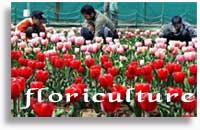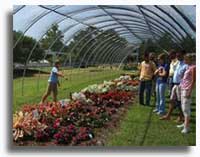FLORICULTURE
Introduction
Floriculture, or flower farming, is a discipline of horticulture which is concerned with the cultivation of flowering and ornamental plants for gardens and for floristry. The development and plant breeding of new varieties is a major occupation of floriculturists. Floriculture is all about growing plants for its beautiful flowers. Demand of flowers is increasing very much day-by-day because of a change in human attitude towards social and religious values. Flowers are now used in almost every function in India due to which its domestic demand is also rapidly increasing.
International demand of cut-flowers soars up specially during X-mas and Valentines day. Flowers like roses, gerbera, carnation, gladiolus, chrysanthemum, orchids and lilies are in very much great demand. Annual growth potential of floriculture industry is usually about 25-30%. This rapid rate is based on its export potential. The market is vast and sky is the limit for export of Indian cut flowers.
Floriculture is the study of growing and marketing flowers and foliage plants. It mostly includes cultivation of flowering and ornamental plants for sale or for use as raw materials in cosmetic and perfume industry and the pharmaceutical sector. The floral industry today has grown to much larger proportions and offers a wide scope for growth and profits. In India, Floriculture industry comprises flower trade, production of nursery plants and potted plants, seed and bulb production, micro propagation and extraction of essential oils.
India has an enormous genetic diversity, varied agro climatic conditions, versatile human resources, etc which offer a unique scope for judicious employment of existing resources and exploration of avenues yet untouched.Though the annual domestic demand for the flowers is growing at a rate of over 25% and international demand is at around Rs 90,000 crores, India's share in the international market of flowers is very much negligible. India has a blooming future as far as floriculture is concerned. Floriculture can be mostly done in open fields or in polyhouses. However, culture in polyhouses is preferable as it provides an artificially controlled environment where the threat from diseases, insects, high temperature, intense light, heavy rains, etc. are minimized. Hence, flowers are produced round the year without any seasonal constraints.
Floriculture in polyhouses are of two types
Soil Culture : Plants are grown in soil.
Soilless/hydroponic Culture :
Plants are grown in pots which are without soil. Coco-pit/saw dust/sand is used in pots in place of soil. Nutrients and water are supplied through pipe or drip from outside. Hydroponically produced flowers are good in quality and fetch maximum price in the market.
Eligibility:
In order to study Floriculture, one should have completed 10+2 with Botany as an option. To get admitted into an agricultural university offering degree in Floriculture/Horticulture, one has to pass an entrance examination conducted by them.
Job Prospects
Some of the potential employers:
Floriculture units:
Floriculturists are majorly involved in the propagation and growing of cut flowers, flowering potted plants, foliage plants and bedding plants. They plant, prune, water, fertilize, harvest and ship these plants as well as monitor and also manipulate the environment under which they are grown both indoors in green houses and outdoors in field production where the climate is favourable.
Outdoor design consultancy firms:
Companies which are engaged in horticulture landscaping and plantation employ floriculturists and horticulturists in supervisory positions and for development and maintenance of gardens.
City planners
Fand builders and those who carry out the work of maintenance at various sites employ floriculturists and horticulturists.
Cosmetics and perfume industry-
FValue addition in the form of extraction of pigments, essential oils, pharmaceutical and nutraceutical compounds has emerged as one of the frontline avenues in floriculture and it is in this connection that floriculturists are employed in the perfume industry.

You can set up your own venture, growing flowers for the domestic or export market, growing ornamental plants, running nurseries, or providing gardening and landscaping advisory services.
In India, Karnataka is the leader in floriculture, accounting for 75% of India's total flower production. The state has highest area under modern cut flowers, and 40 flower growing and exporting units. The expert committee set up by Govt. of India for promotion of export oriented floriculture units has identified Bangalore, Pune, New Delhi and Hyderabad as the major areas suitable for such an activity especially for cut flowers. APEDA (Agricultural and Processed Food Products Export Development Authority) is the registering authority for such units.
The employment opportunities in such a field is as enormous as the nature of work itself. One can join the field of floriculture as farm/estate managers, plantation experts and supervisors, project coordinators, etc. Research and teaching are some other avenues of employment in the field. Marketing of Floriculture products for different ventures is emerging as a potential segment of this field. Besides one can work as consultant, landscape architect, etc with proper training. One can also work as an entrepreneur and offer employment to others. In addition to these careers which involve research and actual growing of crops, floriculture also provides service career opportunities which include such jobs as floral designers, ground-keepers, landscape designers, architects and horticultural therapists. Such jobs require practitioners to deal directly with clients. Professional qualification combined with an inclination towards gardening and such other activities produces efficient floriculturists and landscaping professionals. The skills and knowledge required are imparted under the professional courses of floriculture and landscaping.
Course Areas :
Courses in floriculture are available such as specialisations at the postgraduate and doctoral levels. Besides there are Certificate courses and diploma courses offered by some universities. Most colleges do not conduct a separate course for floriculture or horticulture at the under-graduate level, but treat it as part of the academic curriculum of agriculture. The basic eligibility criteria for a B.Sc. in Agriculture is 10+2 with sciences including Physics and Biology. For an M.Sc. in Horticulture, one must have a B.Sc. degree in Agriculture or a related subject. For Ph.D the basic eligibility criteria is a Master's degree in Horticulture/Agriculture or allied sciences and the other qualifications required may vary from one university to another for eg, some universities require that the candidate must be qualified in Junior Research Fellowship (JRF) conducted by UGC.

Selection : In most of the States, selection to the graduate course in Agriculture colleges is on the basis of an All India Entrance Examination in Biology, Physics, Chemistry and Maths of plus 2 level or on the basis of the entrance examination conducted by the concerned universities. For admission to masters degree programme, an All India Entrance Examination is conducted by the Indian Council for Agricultural Research (ICAR). Besides ICAR other universities like Jawaharlal Nehru University, Delhi also conduct entrance examinations for the vacancies in their respective institutes.
Personal Skills
People interested in floriculture as a career should be patient, analytical and observant. They must be detail oriented and accurate in their work. As in any horticultural career field, a love of nature is essential. Creativity and artistic flair along with physical stamina and manual dexterity will make candidates apt to work in this field. Good verbal communication skills are essential for interacting with both suppliers and customers. Computer skills are helpful for placing supply orders, maintaining inventory records, and doing book keeping for those intending to turn entrepreneurs and manage their own businesses. Floriculture is a colourful career which offers aspirants good growth prospects and opportunity to explore new avenues. Qualified floriculture specialists can be employed at various levels both in the government sector as well as in the corporate sector.
Floriculture Colleges
Floriculture |
Remuneration
Salary depends on the nature of work one is involved in. While gardeners and labourers may get paid anything between Rs 2000 to Rs 3000 per month, freelance workers, designers and consultants may negotiate their pay packets depending on the place and nature of work. As this industry depends on lifestyle and purchasing power of the public in general, and on the availability of raw materials and finished products remunerations and profits may vary.
